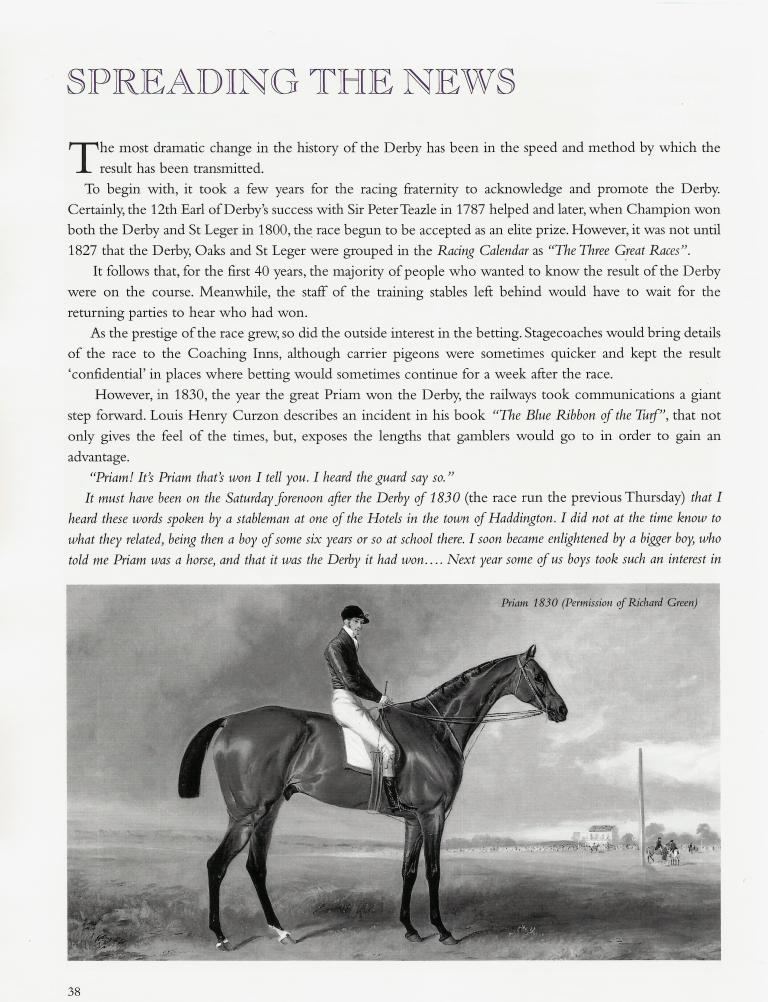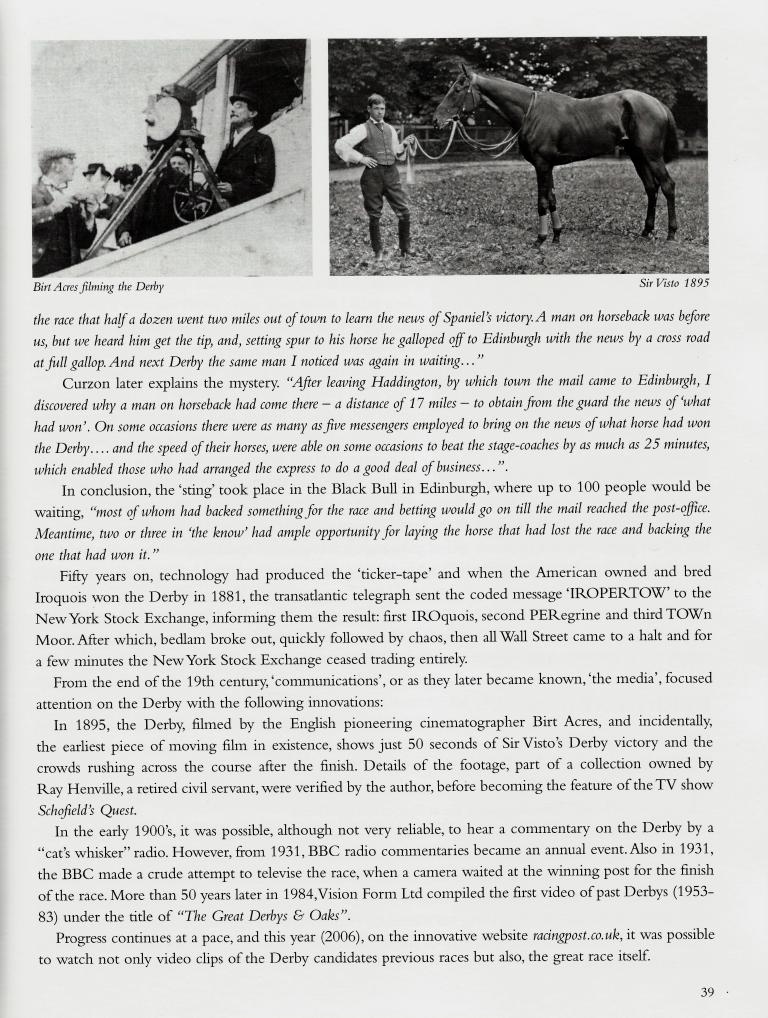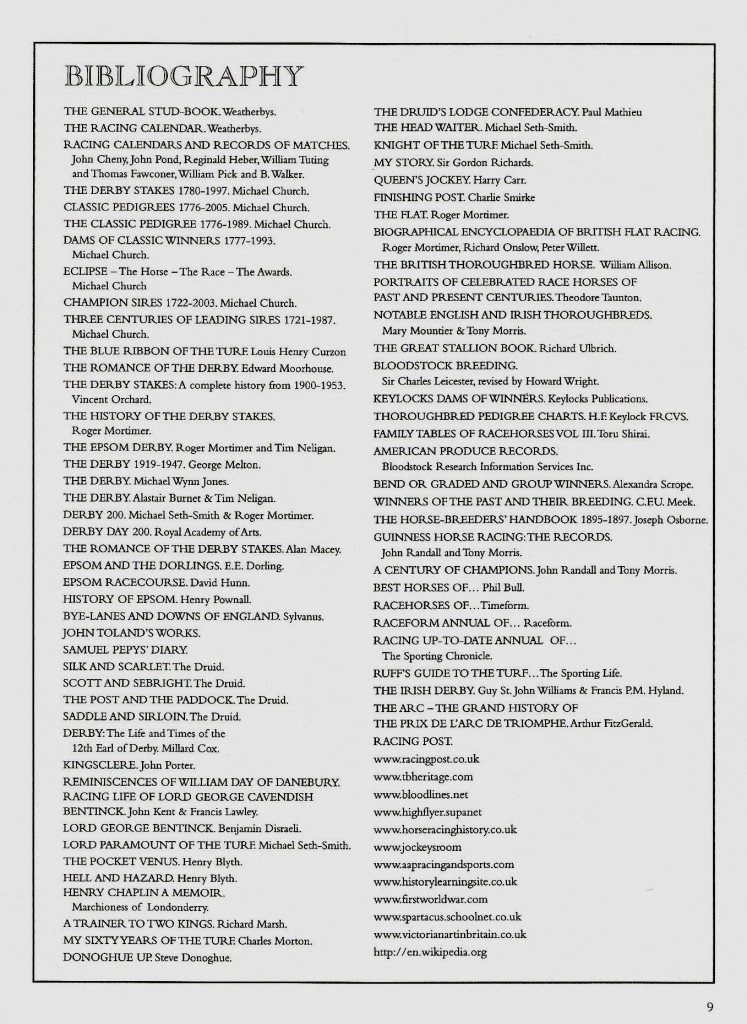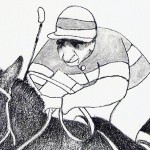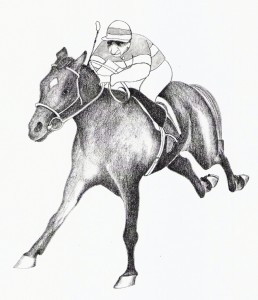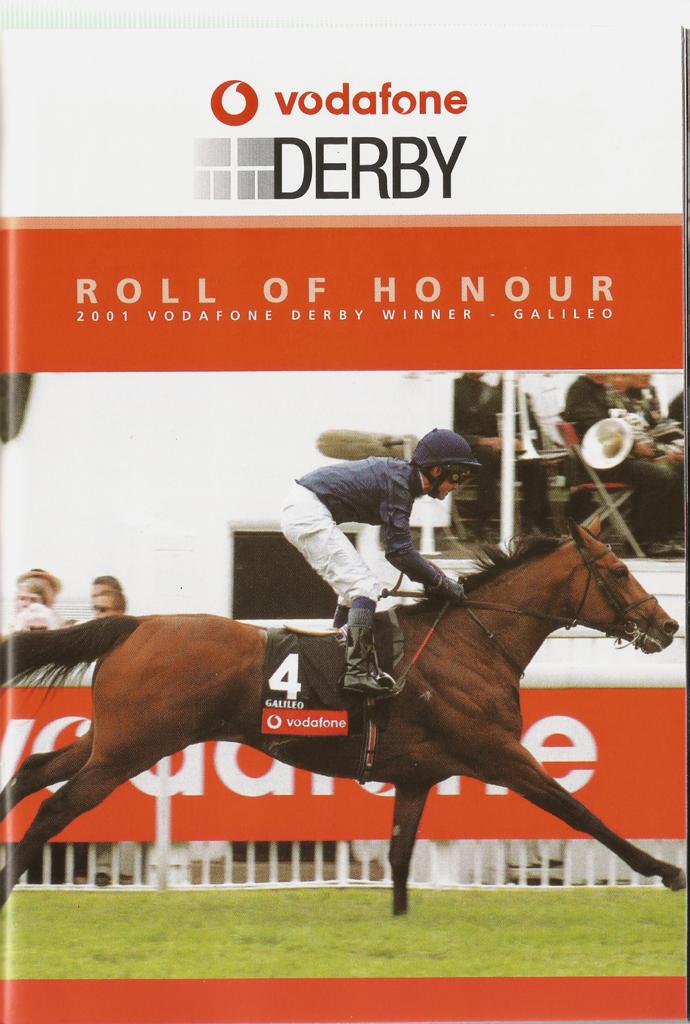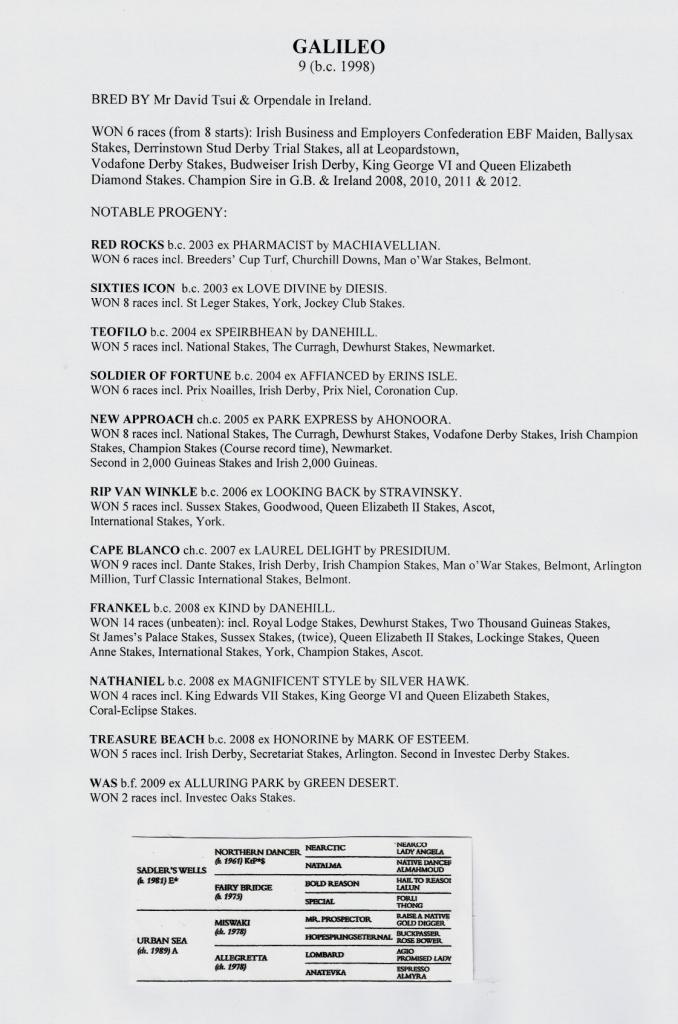A Monday Grand National
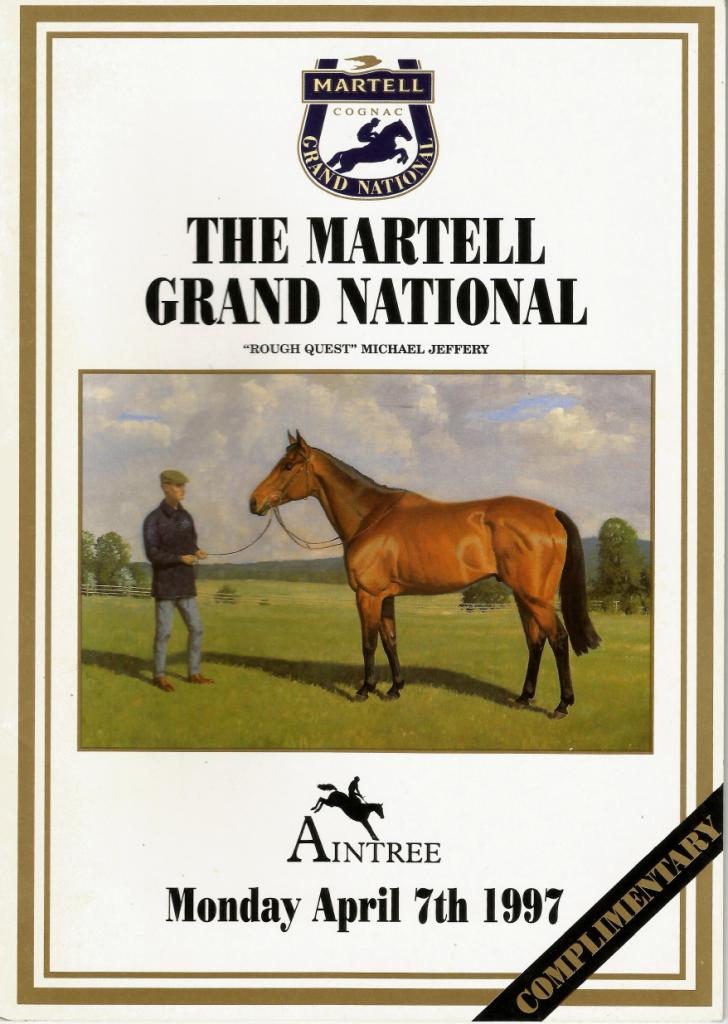
Father Green had been reading in the Press that the up-coming 1997 Grand National was to be the 150th running. This year’s race looked wide open and in Perry’s words, “Was not to be missed.”
Although he had previously booked his County Stand Badge, how he would travel to Liverpool and, whether he would stay up there for more than a day, he had yet to decide. Then strangely, on the Monday, he received a call from a long lost friend, Father Tod Abraham.
“This is a surprise, after all this time too. What’s been happening?”
“Well, remember old Tom Tooley from our seminary days? He and I were talking about the Grand National and your name came up. We were remembering how you loved the race and the good times we had at Aintree. So, we thought, why not do it again?”
“It took me a couple of days to track you down on the Catholic radar, but now that I’ve found you, what do you say?”
“Count me in,” said Perry, enthusiastically and straight away agreed to share their Aintree B & B.
“We’ve booked it Wednesday to Wednesday,” said Tod, “so, Thursday to Saturday we’ll be racing and the rest of the time acting like tourists.”
“There is just one thing Perry, I’m told there are only two single beds and, the living room’s quite small, but there’s a large settee which makes up into a bed, if you don’t mind sleeping there?”
A short silence followed, after which, Perry, ever conscious of his six-foot-
four-inch frame, answered bravely, “Oh that’s fine, really it is.”
The conversation then drifted to old seminary days and some uncomfortable memories for Perry, as Tod touched on the late night poker school in which Tom Tooley claimed he had lost a tidy sum to Perry, who had bluffed the pot with a pair of three’s.
Perry sighed – “Ah, the stuff of legends,” but then quickly and diplomatically ended the call with, “It’ll be fantastic to see you both again, let’s hope this year we get the winner.”
For the rest of the day, Perry seemed a little reflective. He had really only planned to go to Aintree for a day or two, but somehow, he’d got carried away in the excitement. Emily, however, having overheard part of the conversation and unable to bear his indecision any longer, came up with the following suggestion.
“Father, why don’t you ring Father Abraham and tell him you’ll be travelling up early on the Friday morning – Euston to Lime Street – drop your bag in at their B & B and then go racing?”
Arriving at Aintree racecourse, Perry felt a surge of excitement. It looked like a fair size crowd for the Friday and although the weather was overcast and grey, he was very glad to be there. On meeting up with Tod Abraham and Tom Tooley, he learned that Tod had heroically relinquished his bed to him during his stay and now, he looked forward to two days’ racing.
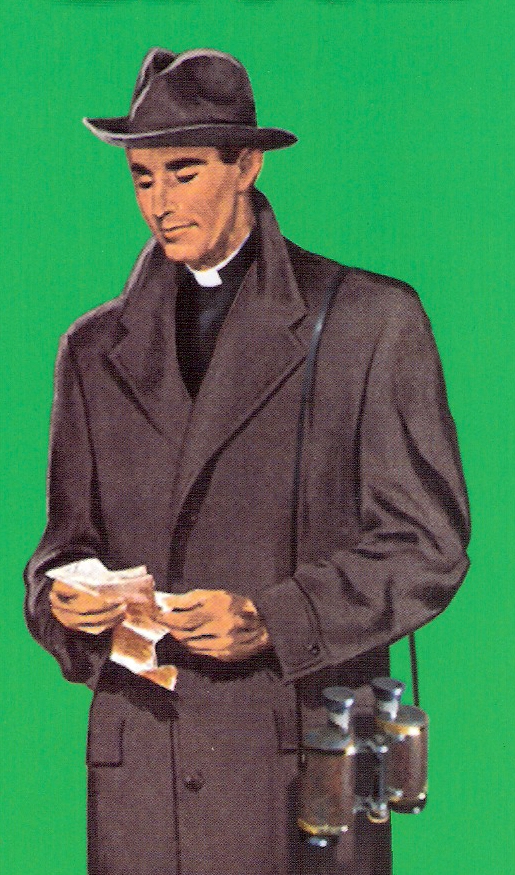 His betting, however, could have gone a little better, having backed The Last Fling, second to Cyborgo in the Mildmay, and then Highlandman, second again, to Blue Cheek in the Fox Hunters. Never mind this was like a holiday to Perry and he was determined to enjoy every minute of it.
His betting, however, could have gone a little better, having backed The Last Fling, second to Cyborgo in the Mildmay, and then Highlandman, second again, to Blue Cheek in the Fox Hunters. Never mind this was like a holiday to Perry and he was determined to enjoy every minute of it.
The following morning, after a hearty breakfast of ham and eggs, he left his fellow priests to take the Racing Post back to his bedroom in anticipation of the afternoon’s sport – this was the time that he loved best.
Arriving on course, the view from the County Stand was exhilarating. High in the stand he was opposite the winning post and, with his binoculars and view of the big screen he hoped to follow the big race throughout.
Perry’s luck, however, was still absent without leave – the first three races returning winning S.P’s of 25-1, 20-1 and 14-1 – so filling the bags of almost every bookmaker to the brim. Only a popular National winner would remove the hurt of some 60,000 spectators on course and a further ten million punters at home.
Then, with the horses coming into the paddock, the Merseyside police received a coded warning that a bomb had been planted at Aintree. Nigel Payne, Aintree’s Press Officer, broke the news, live, to BBC’s anchor-man Des Lynam and immediately after, loudspeaker instructions were broadcast to evacuate the course. In addition, as part of the security operation, racegoers were forbidden to remove their vehicles from the car parks for the remainder of that day.
Meanwhile, the search for the bomb continued.
Jenny Pitman, a previous winning trainer, made a tearful plea to Lynam:
“We have the lunatic element here and we can’t give in to them.”
As the gravity of the situation became known, the Managing Director and Clerk of the Course, Charlie Barnett, confirmed that two coded bomb warnings had been received and with the minimum of decorum, asked Lynam and the BBC to leave Aintree immediately.
At this point, Father Green, and those around him, still hoped that racing would continue later. However, the sight of tens of thousands of people spilling out onto the course and a few hooligans clambering over the fences, caused that hope to disappear, leaving only a painful memory of the day that had promised so much.
Being six-foot-four sometimes has an advantage, for although Father Green was hemmed in against the running rail, he could at least see where the meandering mob was heading. Similarly, those within shouting distance could
see the tall figure of a priest in a Homburg, trying to move through the crush without forcefully pushing or shoving.
“Father Perry, Father Perry,” a strong Irish brogue cut through the dejected babble and soon, Tod, Tommy and Perry were reunited.
Later that evening, when Tod went out to get a Chinese takeaway for them all, he was delighted to hear from Larry Wong that the National was to be run on Monday at 5 p.m. – the only race on the card.
In the meantime, Perry had nipped out to buy a bottle of Glenmorangie whisky and six cans of Guinness. It was going to be a good night after all.
It was some time after the three men demolished their Chinese supper, and only then, as an afterthought, Tommy enquired, “Does anyone fancy a game of cards?”
“I found an old pack,” Tommy continued, “in the chest of draws in my bedroom – they’re all there, I’ve counted them, what do you think?”
Tod looked a little uncomfortable at first, before referring the question to Perry.
“You’re the expert, so they tell me. What should we play Perry?”
“Five-card brag can be fun. It’s a simple game,” he said airily, “you are dealt five cards each; make a hand with your best three and throw the other two away. Like poker really, but a run beats a flush. Oh, and a A-2-3 beats a A-K-Q,” he added, nonchalantly, “that’s usual I believe.”
They decided to play for 50p stakes and since none of them had much in the way of change, Perry found a full box of matches by the gas fire to improvise as chips.
Tommy and Tod both remembered playing 3-card brag as schoolboys, so having two further cards to choose from felt like a luxury.
After half-an-hour, with the game heading towards boredom, Perry made the suggestion that they open the Glenmorangie. Not surprisingly, the game took off.
Tod was the first to get a really good hand – a 6-7-8 all in spades. Tom and Perry went with him for a while, till Tommy threw in. But Perry, for reasons best known to himself, stayed in longer than perhaps he should. Tod picked up around 20 matches and looked very pleased.
As the night went on and the whisky went down, so the stakes grew bigger. In fact, Tom found it necessary to knock on the landlady’s door for another box of matches. Then, as so often happens with this game, all three men drew
exceptional hands at the same time. Tod picked up three Kings, Tommy a Q-J-10 of Diamonds and Perry, well, we’ll have to wait to see his cards.
Needless to say, each player thought they had the winning hand and when the matches ran out, apologetically, but nevertheless enthusiastically, fivers and then tenners took their place.
After ten minutes of building up a sizable kitty, each player was faced with the strong possibility that there might be a better hand than their own. And whilst Tom had liberally contributed, he was the first to crack, and threw in.
Thereafter, Tod and Perry continued to bet as if their money were only lent, until Tommy counted the kitty as nearing £150. At this point, they braced themselves with another whisky and tried to take stock.
Tod could not believe that Perry had three aces and although happy with the original 50p stakes, he now felt the need to press on, quietly harbouring the thought that it would teach Father Green a lesson.
Perry, too, took stock and slowly developed the face of a gravedigger – but whose grave was he digging?
Ten minutes later, with the kitty up to £250, Perry paid his final twenty to see Tod’s hand.
“Read’em and weep,” Tod said joyfully, having remembered the phrase from an old movie, and then spread his Kings out in front of Perry.
There followed a short silence, until Father Green slowly tipped over his cards – three fives!
“What a relief,” said Tod, “Thank heavens for that.”
But it was Perry who scooped up the money.
“Sorry Tod, but three fives is the top hand – just like three-three’s in three-card brag.”
Tod’s face was a picture of disbelief, until Tommy backed up Father Green.
“He’s right Tod, remember when we played three-card brag as kids and you won my wristwatch with three three’s.”
Tod regained his composure, while Perry folded the notes into his pocket.
“Well, I really have to thank you both,” Tod said unconvincingly, “you have taught me a valuable lesson, one, I should have learned long ago.”
Then, with a noticeably croaking voice he enquired, “Say, is there any more of that fine scotch whisky left?”
Sunday morning, the three of them trooped off to Hope Street to hear the 11 o’clock Mass at the Metropolitan Cathedral of Christ the King. None of them had visited it before and so when the crowds had gone they took time for a personal tour. Towards the end, Perry read the first lines of a poem written by a local newspaper editor on how the people of Liverpool had built the Cathedral.
“They did it by touting the streets and pubs and knocking on doors like their own.
They did it, bless ‘em, by giving, when they had so little to give.”
As they were about to leave, Perry excused himself, saying, “I’ll catch up with you boys.”
Tod and Tommy then surreptitiously watched him engage one of the priests and pass him a bulky envelope.
Later when out in the road, Tod asked, “Where did you go Perry?”
“Oh, I just went to slip the priest a couple of quid.”
* * * * * * * * * * * * * * * * * *
Monday’s Grand National was due off at 5 p.m., the time set to encourage as many locals as possible to attend. It was a fine day and Tod, Tommy and Perry, joined the large crowd with a spirit of Dunkirk defiance, as the 36 runners went to post.
Go Ballistic (fourth in the Cheltenham Gold Cup) and the grey, Suny Bay, headed the market, whilst the New Zealand bred Lord Gyllene was a popular each way choice at 14-1.
My own recollection of the race at the Raynes Park offices of Racing Post was that work stopped completely, while staff gathered to see courage and tenacity triumph in the face of adversity.
Back at Aintree, Lord Gyllene, under the joint bottom weight of 10 stone, made virtually all the running to win by 25 lengths from the gallant Suny Bay, with the 100-1 shot Camelot Knight, third of the 17 finishers.
That evening, Tod, Tommy and Perry tucked in to large portions of steak and mushroom pie, washed down with pints of Guinness, until finally, Perry’s taxi arrived to take him to Lime Street Railway Station.
They all agreed that in spite of the disruption, they’d had a great time and promised each other to do it all again next year.
“But, with some other card game, aye,” said Tod, with feeling, as he carried Perry’s bag to the door.
This story was taken from Michael’s latest book of short stories, The Gambling Adventures of Father Green, of which he has a few signed copies for sale.
